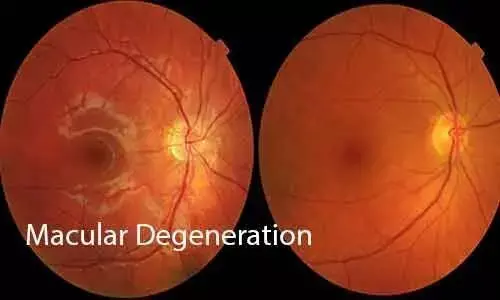- Home
- Medical news & Guidelines
- Anesthesiology
- Cardiology and CTVS
- Critical Care
- Dentistry
- Dermatology
- Diabetes and Endocrinology
- ENT
- Gastroenterology
- Medicine
- Nephrology
- Neurology
- Obstretics-Gynaecology
- Oncology
- Ophthalmology
- Orthopaedics
- Pediatrics-Neonatology
- Psychiatry
- Pulmonology
- Radiology
- Surgery
- Urology
- Laboratory Medicine
- Diet
- Nursing
- Paramedical
- Physiotherapy
- Health news
- Fact Check
- Bone Health Fact Check
- Brain Health Fact Check
- Cancer Related Fact Check
- Child Care Fact Check
- Dental and oral health fact check
- Diabetes and metabolic health fact check
- Diet and Nutrition Fact Check
- Eye and ENT Care Fact Check
- Fitness fact check
- Gut health fact check
- Heart health fact check
- Kidney health fact check
- Medical education fact check
- Men's health fact check
- Respiratory fact check
- Skin and hair care fact check
- Vaccine and Immunization fact check
- Women's health fact check
- AYUSH
- State News
- Andaman and Nicobar Islands
- Andhra Pradesh
- Arunachal Pradesh
- Assam
- Bihar
- Chandigarh
- Chattisgarh
- Dadra and Nagar Haveli
- Daman and Diu
- Delhi
- Goa
- Gujarat
- Haryana
- Himachal Pradesh
- Jammu & Kashmir
- Jharkhand
- Karnataka
- Kerala
- Ladakh
- Lakshadweep
- Madhya Pradesh
- Maharashtra
- Manipur
- Meghalaya
- Mizoram
- Nagaland
- Odisha
- Puducherry
- Punjab
- Rajasthan
- Sikkim
- Tamil Nadu
- Telangana
- Tripura
- Uttar Pradesh
- Uttrakhand
- West Bengal
- Medical Education
- Industry
Lupus a harmful trigger for macular degeneration, finds study

Researchers at the University of Virginia School of Medicine have made a discovery linking lupus, a potentially debilitating autoimmune disorder, and macular degeneration, a leading cause of blindness.
The two diseases share a common contributor to harmful inflammation, the scientists found. The insights could let researchers develop new treatments for those diseases and other conditions driven by the newly discovered inflammation source.
"We were quite surprised at the common link between lupus and macular degeneration," said Jayakrishna Ambati, MD, of UVA's Department of Ophthalmology and the founding director of UVA's Center for Advanced Vision Science. "It appears that the new inflammatory pathway we identified could be therapeutically targeted for many chronic diseases."
Macular Degeneration and Lupus
Ambati and his collaborators have discovered an unknown role for an inflammasome – an agent of the immune system – called NLRC4-NLRP3. Inflammasomes play an important role in marshaling the body's defenses to protect it from invaders such as viruses and bacteria.
In lupus and atrophic macular degeneration, however, it appears that NLRC4-NLRP3 contributes to harmful inflammation, the UVA researchers found. In lupus, it helps drive the hyperactive immune response that leads to symptoms such as joint pain, rash, fever and more. In macular degeneration, meanwhile, NRC4-NLRP3 appears to contribute to inflammation that destroys the vital light-sensing cells in the eye's retina.
Ambati's new work helps explain why. The inflammasome, he found, is sent into action by a special class of genetic material called "short interspersed nuclear element RNAs," or SINE RNAs. This type of RNA makes up more than 10% of our genomes, and it activates in response to cell stresses such as infection, genetic damage and aging. The resulting inflammation caused by SINE RNAs can be harmful in many chronic diseases.
SINE RNAs are elevated in both macular degeneration and lupus, Ambati found. In addition to discovering the role of SINE RNA in the two diseases, Ambati and his colleagues identified an unknown receptor for the SINE RNAs called DDX17. Scientists have been looking for this receptor for decades, and the new discovery helps them better understand the process that leads to the harmful inflammation.
"These findings indicate that blocking a single inflammasome might not be enough, and that targeting both the NLRC4 and NLRP3 inflammasomes would be a superior strategy," Ambati said.
Using this new information, scientists may be able to target the source of harmful inflammation in lupus, macular degeneration and other diseases driven by SINE RNAs. That could lead to new treatments to benefit patients, the UVA researchers say.
"We're excited to have developed drugs called Kamuvudines that block this dual inflammasome, which we anticipate will be in clinical trials next year," Ambati said.
Findings Published
The researchers have published their findings in the scientific journal Science Immunology. The work is featured on the journal's cover. The research team consisted of Shao-bin Wang, Siddharth Narendran, Shuichiro Hirahara, Akhil Varshney, Felipe Pereira, Ivana Apicella, Meenakshi Ambati, Vidya L. Ambati, Praveen Yerramothu, Kameshwari Ambati, Yosuke Nagasaka, Dionne Argyle, Peirong Huang, Kirstie L. Baker, Kenneth M. Marion, Kartik Gupta, Bo Liu, David R. Hinton, Scott W. Canna, Tamer Sallam, Srinivas R. Sadda, Nagaraj Kerur, Bradley D. Gelfand and Jayakrishna Ambati.
Jayakrishna Ambati is a co-founder of iVeena Holdings, iVeena Delivery Systems and Inflammasome Therapeutics and has done consulting work unrelated to the research. A full list of the authors' disclosures is included in the paper.
Hina Zahid Joined Medical Dialogue in 2017 with a passion to work as a Reporter. She coordinates with various national and international journals and association and covers all the stories related to Medical guidelines, Medical Journals, rare medical surgeries as well as all the updates in the medical field. Email: editorial@medicaldialogues.in. Contact no. 011-43720751
Dr Kamal Kant Kohli-MBBS, DTCD- a chest specialist with more than 30 years of practice and a flair for writing clinical articles, Dr Kamal Kant Kohli joined Medical Dialogues as a Chief Editor of Medical News. Besides writing articles, as an editor, he proofreads and verifies all the medical content published on Medical Dialogues including those coming from journals, studies,medical conferences,guidelines etc. Email: drkohli@medicaldialogues.in. Contact no. 011-43720751


